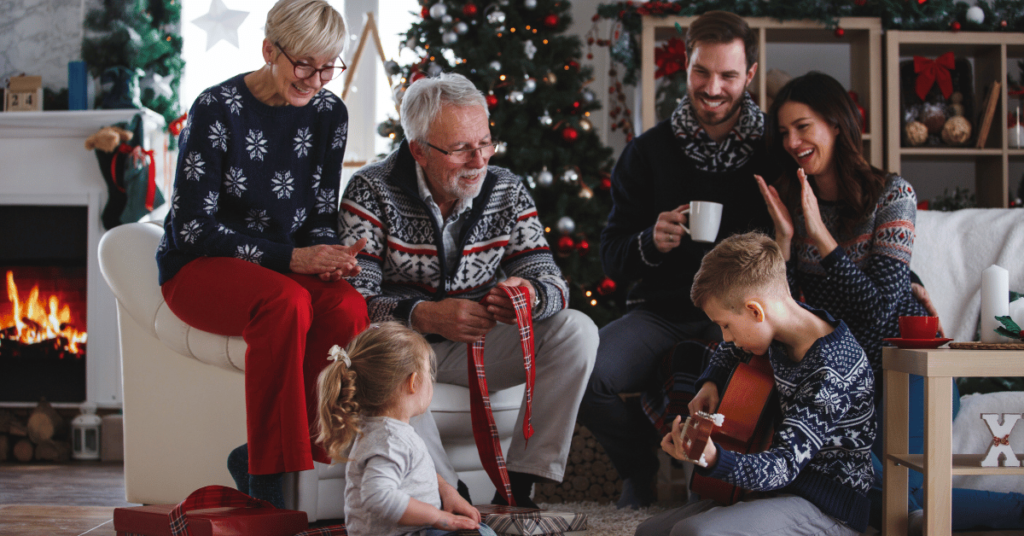With many people celebrating the Christmas holidays, which are just around the corner, we would like to share some helpful tips and reminders on how everyone can have a stress-free, peaceful, memorable, meaningful, and truly Merry Christmas.
1. Create new traditions or modify old ones.
Start with making things simple. Every person living with symptoms of dementia will be different. For some, instead of using multiple cutlery and plates, try making the table setting as simple, yet festive as possible.
If old family traditions trigger negative memories or experiences, create new ones. One family shared that instead of picking up a large Christmas tree (their old family tradition), they opted to have a smaller artificial tree to make things more simple and less work for everyone.
You can also consider sitting in a room together and playing each family member’s favourite Christmas carol (or singing) while reminiscing past fun memories. This is also a good way of getting to know each other better and sharing stories.
2. Familiarity brings comfort.
If the person we are caring for is living in a care home, it may be more practical to bring the Christmas celebration to them instead of taking them out of their already familiar surrounding (even if you are bringing them to the home they used to live in). This may reduce confusion and disorientation especially when you return them back to the care home.
Placing ourselves into their shoes, we must remind ourselves that there will be a lot of visual and auditory stimulation during this big family gathering and it is most certainly a break in their routine. Routines for someone with cognitive impairment give them a sense of security. What may be fun for you, may not necessarily be fun for them.
Consider as well, the preferences of the person you are caring for – do they enjoy big, loud, festive gatherings; or are they the type that enjoys simple, more intimate small gatherings?
3. Be realistic with your plans and chores. Don’t over-commit. Delegate and ask for help if necessary.
Things are always easier “in our head.” When our energy is high and we are in a great mood, we get excited and feel like we can do anything. Then, on the day of or the days leading up to the event, we start to get anxious, feel overwhelmed, and panic. We now feel we are committed but neither have the energy nor the time to do what we had planned to do.
Make a habit and get comfortable asking for specific help. Delegate. People may want to offer help but may be uncomfortable offering it. To make it easier for family and friends to lend a hand, be specific on the tasks that you would appreciate help with.
Remember that beautiful and meaningful memories can be something as simple as a take-out dinner from a familiar restaurant, opening presents, and going through a family album. What is most important is the quality time you spend with each other.
4. Remember the mantra “keep the peace” and always take deep breaths.
When things get strained or stressful or tense, remember to pause, step back and/or make an excuse to leave the room, take deep purposeful breaths, and under your breath, you can even say “peace.” You can repeat this as many times as you need and then come back to the room.
5. Have a plan “B.”
As much as we try to plan ahead, things don’t always go as planned. The weather, for instance, is one thing we have no control over. You may plan to come a day or a few days earlier instead of what you had originally planned, or, if at all possible, maybe you can make arrangements for a sleepover, or book a hotel close by (hotels are usually cheaper on Christmas day).
5. Avoid negative triggers.
Remove any decorations or stop playing songs that might trigger a bad or painful memory. If the sight of snow gives them anxiety, position their seats facing away from the window. Be aware of stories that you share during the holidays and remind your other family members (and new family members) or guests of the do’s and don’ts.
If you notice the person you are caring for is getting anxious, remember to gently inquire about what’s going on and what they may be feeling or needing. Then practice providing reassurance and making them feel safe and secure.
6. Set reminders and checklists for yourself.
If you are taking your loved one away for the holidays make sure to create alerts and a checklist of things to do before the trip and what to bring along with you. For instance, making a list of their medications, and important contact numbers, inquiring if the place you are taking them to is accessible, has wifi, and has good cell service. Take into consideration weather forecasts, travel time, and how comfortable your loved one is during long travel, especially if they are staying at a place they are not familiar with and is not part of their usual routine. Keep activity to a reasonable amount per day so as not to overwhelm the person. Give them enough time to rest and recover. Again, make sure you have a plan B just in case things don’t go as planned.
These are just some of the helpful tips that have come up from my past experiences working with families. Our aim is to support all families and help them to have a happy family celebration and create beautiful memories that all can cherish.
We would like to hear from you with regard to your Christmas stories (current or past challenges). Please send your stories and/or questions to Info@DementiaSolutions.ca
Happy Holidays from all of us at Dementia Solutions!



